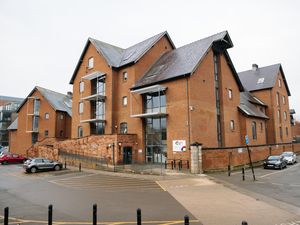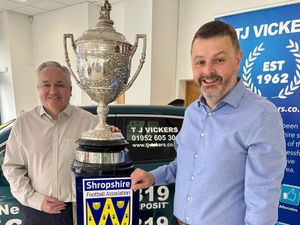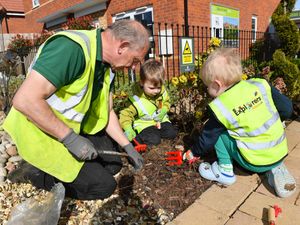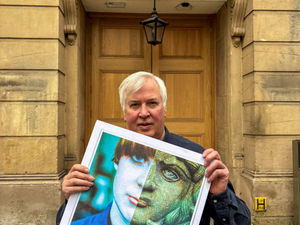The violin lesson that led to the discovery of Shrewsbury 10-year-old's inoperable brain tumour
Cleo Postlethwaite’s family speak to us about their little girl’s inoperable tumour and how their lives have been turned upside down over the last year.
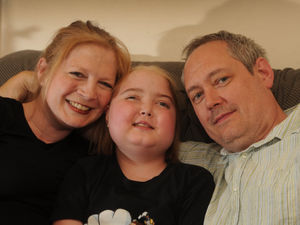
“Do you want to watch Charlie and the Chocolate Factory in the front room?”
It’s a normal enough question for any parent to ask their 10-year-old child.
After a smile and a nod, mum Jane Park leads Cleo to the sofa and settles her down to watch the film with a cup of tea.
That sense of normality is paramount for this little girl, who is living with an inoperable brain tumour.
“The prognosis is clear and it’s pretty awful,” says Jane. “We are living each day at the moment. Every moment she is with us with her feet cuddled up on your leg she’s a happy girl.”
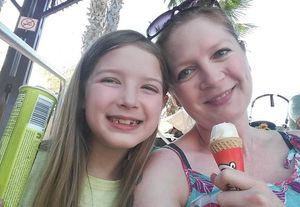
The violin lesson
Cleo is a talented violinist, which is no surprise given her family’s musical background.
Her dad Alex is the leader of Shrewsbury Symphony Orchestra, with whom mum Jane plays viola.
But it was the violin that would lead to a discovery that changed the family’s world. It was Monday, March 12, 2018 and Cleo was due to take her Grade One violin exam.
“We were doing violin practice before an exam and Cleo kept looking at me like I was torturing her,” says Jane, 40.
“I thought ‘this isn’t good’. But you know, kids go off things and I didn’t want to push her into things she didn’t want to do.”
But Cleo’s violin teacher rang Jane and Alex to say she was worried because Cleo couldn’t even hold up her instrument in the last lesson.
“This is a girl who most of the time you have to ask where she is as she was so active,” smiles Jane. “We used to call her a little gazelle.”
Cleo, a sporty and bright pupil at Crowmoor Primary School in Shrewsbury, had stopped producing any work and had been falling asleep in lessons, at one time for two hours.
The reason for the loss of energy was unimaginable.

“There had been a lot of little sort of disparate signs that Cleo wasn’t well and we’d always attributed it to a virus,” adds Jane.
“You can always find a reason, and the first reason would not be ‘she’s probably got a brain tumour’.
“You kind of find a reason for it all, and I think that’s quite human.”
But after the violin teacher called, Jane and Alex, 45, decided it was time to see the GP, who after a check-up referred them to a paediatrician that same day.
“We left her bag and coat at school because she was going back later that day,” says Jane. “But she never went back.
“They found a swelling behind the eye. I knew that didn’t happen without a reason and I just knew there was something sinister under it and had nightmares all night. Within days she was in hospital in Birmingham for a biopsy.”
Diagnosis
On April 13, just four weeks later, the family were given the diagnosis they were dreading.
“It’s a date forever etched in my mind,” says Jane. “The nightmare was true.”
The words given to them were Grade Three anaplastic astrocytoma, a fast-growing form of cancerous brain tumour which only affects a few children in the country.
“The name meant nothing to me at the time. It really was totally overwhelming,” says Jane. That was quickly upgraded to Grade Four astrocytomas, usually called glioblastoma, for which the five-year survival rate is just five per cent.
Cleo has her own name for the tumour, her “fat jellyfish”.
The treatment she underwent initially seemed to help Cleo’s condition improve. Before the radiotherapy and chemotherapy started she had lost the ability to see and walk but that fortunately returned and Jane says that Cleo was extremely well and able to be more independent throughout last Autumn and into Christmas.
Cleo had a great time over the festive period with her older sister Ella, 13, younger brother Oscar and baby brother Tristan.
“This Christmas was beautiful because she was so well and we weren’t thinking about it in any other terms except having fun together as a family. There was no sinister significance of ‘we’ve got to make the most of it’ – it was brilliant,” says Jane.
“But January 2 was when it all went wrong. We had been at my mum’s up in Cumbria. Cleo started to have a seizure in the car.”
She was taken to Telford’s Princess Royal Hospital where a scan was carried out and found that Cleo’s tumour had returned. “Since then we have had a couple of scans and a couple more seizures and we could see how fast the tumour was growing,” says Jane, wiping a tear from her eye.
It was in January that the chemotherapy was stopped and the prognosis became clear.
“It’s been up and down and there have definitely been a couple of points where we thought this is it,” says Alex.
“But she’s here and having a good day. When Cleo wakes up and we ask how she’s feeling and she puts her thumb up to to say she’s good.”
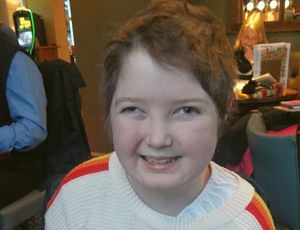
The Team Cleo Fund
The Team Cleo Fund was set up and by Jane and Cleo, as well as others, and has so far raised £17,000 for The Brain Tumour Charity.
“I set it up because I wanted her to see what a fantastic impact she has had on the world, not just in terms of fundraising, but helping people know what the symptoms are and what it’s like,” says Jane.
“Brain tumours are not something which are talked about, and for good reason.
“They are horrific and painful, but if we don’t tell people how will they know. It’s a very rare occurrence but it kills children.”
The Brain Tumour Charity has a list of tell-tale signs which can be seen on its website and Jane said she implores anyone whose child has more than one of these to go and see their GP as early detection can make a big difference.
“Just do it. If you’re wrong brilliant, but if you’re right, well, what have you got to lose,” she says.
“I’m yet to meet a person who knew what the symptoms were.”
If you would like to donate or learn more about the Team Cleo Fund then search for ‘Team Cleo Fund’ on Facebook.

